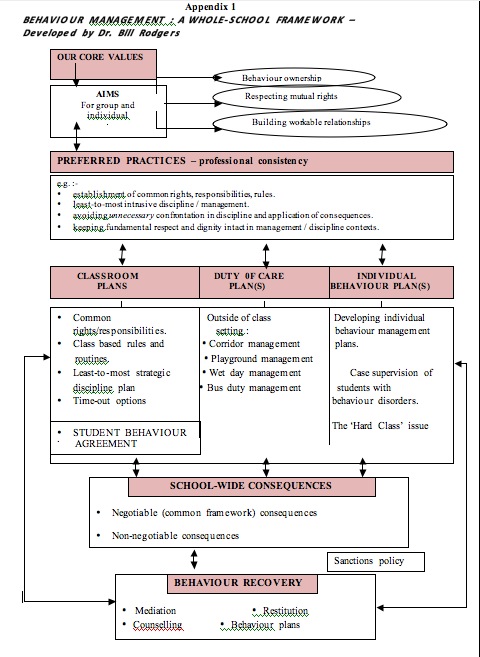St. Declan’s School Code of Behaviour Policy
The staff of St. Declan’s, in conjunction with parent representatives and with input from the children have developed this code of behaviour. The staff would like to acknowledge the advice and support of Dr. Bill Rodgers who gave a whole staff seminar on developing a school wide framework for behaviour and whose work has strongly influenced our approach to behaviour in this school. (see appendix 1)
This code has been developed within the context of St. Declans which caters to a population of students with mild emotional and behavioural difficulties and high functioning autistic spectrum disorders.
St. Declans strives to create a supportive and caring environment for each pupil and aims to enable children to attain their full potential and fulfil their role in society.
The aims of this code of behaviour are to:
- Provide a school wide framework to support positive behaviour and establish preferred practices which maintain a consistent approach to behaviour throughout the school.
- Enable individuals to own their behaviour, and be accountable for the choices they make within the school environment; to respect mutual rights and to do so within the context of workable relationships with other members of this school community.
Core rights accorded to all members of the school community include: the right to feel safe; the right of children to learn (without undue distraction or disruption) and the right to respect and fair treatment. These rights entail responsibilities by all: children, parents, teaching and support staff.
Every effort will be made by all members of staff to adopt a positive approach to the question of behaviour in the school.
The school recognises the variety of differences that exist in children and endeavour to accommodate these differences within the school wide framework for management of behaviour.
It is agreed that a high standard of behaviour requires a strong sense of community within the school and a high level of co-operation among staff and between staff, pupils and parents.
All rules of conduct are based on five key premises, which will be called St. Declans Code. They are:
Being Respectful: using nice manners, being kind and caring, working quietly, using appropriate language, following teachers directions, being helpful, listening, waiting your turn to speak…
Being Responsible: taking care of property, doing homework, arriving on time, having the things you need, following class and school rules, making appropriate judgements about what should be at school, eating a healthy and nutritious lunch, putting litter in the bin…
Being Safe: acting in a considerate, safe manner, playing safely, being careful not to be rough or harm others in any way….
Being Honest: telling the truth even when it’s tough, ‘owning up’ when you’re in the wrong. Telling when you see someone being hurt deliberately..
Being the Best you can be: Having a positive attitude, always trying to do your best – even when it’s not your favourite thing to do.
This code is to be adhered to by all members of the school community: Teachers, SNAs Pupils, Parents, Management and ancillary staff.
The code is displayed in the entrance hall for all to see.
In order to establish a shared professional consistency across the school, all staff adhere to common behaviour management and discipline practices across all areas of the children’s school day.
Behaviour Management Strategies
(1.) Each teacher establishes and clarifies with the children classroom rules responsibilities and consequences based on an age appropriate framework and within the premises of the code. These will be developed with the students at the beginning of the year.
The teacher will also establish the core routines necessary for the smooth running of classroom learning.
This process will culminate in a classroom behaviour agreement. This agreement will be sent home and signed by both children and parents.
(2.) When an inappropriate behaviour needs to be addressed with a student, staff minimise any unnecessary confrontation and instead work with the child using a least-to-most intrusive intervention approach. Behaviour management strategies include:
- Moving closer to the child
- Picture cue, verbal cue, eye contact
- Praising another child exhibiting the preferred behaviour
- Rule reminder, Time out in class
- Filling out a behaviour management worksheet
- Instruct child to remain silent in class and observe desired behaviour
- Modelling desired behaviour
If the issue is not resolved, the following interventions are used and consequences are applied
Informal behaviour conversation (Mirroring, Role Play)
Formal time out in another room (Red Card)
Teachers will keep a written record of all instances of serious misbehaviour as well as a record of improvements in the behaviour of disruptive pupils. Before resorting to serious sanctions, e.g. suspension, the normal channels of communication between school and parents will be utilised. Parents will be involved at an early stage, rather than as a last resort.
Consequences of Inappropriate Behaviour
When implementing consequences for disruptive behaviour, the class teacher intervenes with consequences that where possible relate directly to the child’s disruptive behaviour. Where appropriate the student is asked what they could do to address the behaviour in question. Children can then move forward with a clean slate
Where a students inappropriate behaviour is of ongoing concern, a B.M.P (behaviour management plan) is developed. This plan may include dedicated teaching time to help the child own and change their behaviour, on their road towards self discipline.
The following are consequences of unacceptable behaviour:
- Reasoning with the pupil
- Reprimand (including advice on how to improve)
- Temporary separation from peers, friends or others
- Loss of privileges
- Prescribing additional work
- Detention during a break or after school hours (In the case of detention after school hours, this sanction will only be invoked after consultation and with the co-operation of the child’s parents. Care will be taken to follow Child Protection guidelines at all times)
- Referral to Principal
- Communication with parents
- In School Suspension (with co-operation of Parents)
- Suspension (temporary)
- Expulsion
The overall responsibility for discipline within the school rests with the Principal. Each teacher has responsibility for the maintenance of discipline within his/her classroom, and all staff share a common responsibility for good order within the school premises.
A pupil will be referred to the Principal for serious breaches of discipline and for repeated incidents of minor misbehaviour.
Aggressive, threatening or violent behaviour towards a teacher or another pupil will be regarded as serious or gross misbehaviour, depending on circumstances.
Where a teacher or pupil has been violently assaulted, parents of the child responsible may be asked to attend a meeting at the school prior to their child returning to class so that an agreed behaviour plan can be put in place.
Where there are repeated instances of gross misbehaviour, the Chairperson of the Board of Management will be informed and the parents will be requested in writing to attend at the school to meet the Chairperson and the Principal. If the parents do not give an undertaking that the pupil will behave in an acceptable.-manner in the future, the pupil may have to be suspended for a temporary period. Suspension will be in accordance with NEWB (National Education Welfare Board) guidelines and within the terms of Rule 130(5) of the Rules for National Schools.
In the case of gross misbehaviour, the Board shall authorise the Principal to sanction an immediate suspension (maximum 3 days) , pending a discussion of the matter with the parents.
Expulsion maybe considered in an extreme case, in accordance with Rule 130(6).
Every effort will be made to have a child who exhibits serious oppositional behaviours referred for psychological assessment without delay. Help will be sought, also, from support services within the wider community, e.g. Community Care services provided by Health Boards.
Recognition of positive behaviours (academic and social)
At St. Declans, we support hard work, great effort/improvements and
positive choices made by students both in class and at play. All staff endeavour to
comment on and affirm genuine academic effort and desired social behaviours.
Teachers use a range of incentives to recognise and encourage students efforts. These include:
- Homework pass
- Golden time
- A positive note in the homework diary
- A phone call home
In addition to the above we have a school wide bonus system in place. This includes points for:
- Healthy Lunch
- Homework completed
- School work completed
- Appropriate behaviour in class
- Appropriate behaviour outside of class
Appropriate behaviour and adherence to the principles of the St. Declan’s Code outside of class during transitions, playtime and whole school assemblies is also rewarded by a weekly whole school behaviour incentive scheme using Class Dojo whereby children receive ‘Declan’s Dollars’ which result in both individual and whole class rewards such as extra playtime and class educational outings.
Monthly and annual prize giving assemblies award the following trophies:
- Student of the month
- Improver of the month
In the belief that the most effective schools tend to be those with the best relationship with parents, every effort will be made by the Principal and staff to ensure that parents are kept well informed, that the school provides a welcoming atmosphere towards parents and that parents are not only told when their children are in trouble but when they have behaved particularly well.
At St. Declans School the team of staff and parents work in collaboration to support each child to be the best they can be every day.
This code will be reviewed on an annual basis.
Reviewed by the BOM of St Declans School on 18th June 2013
Rule 130 of the Rules for National Schools
(as amended by Circular 7/88)
School Discipline
1 The Board of Management has ultimate responsibility for discipline in the school under its management and a duty to ensure that a fair code of discipline applies therein. This code should be formulated by the Principal and the teaching staff, in consultation with parents and be approved by the Board.
2 Teachers should have a lively regard for the improvement and general welfare of their pupils, treat them with kindness combined with firmness and should aim at governing them through their affections and reason, and not by harshness and severity. Ridicule, sarcasm or remarks likely to undermine a pupil’s self-confidence should not be used in any circumstances.
3 The use of corporal punishment is forbidden.
4 Any teacher who contravenes Sections 2 or 3 of this Rule will be regarded as guilty of conduct unbefitting a teacher and will be subject to severe disciplinary action.
5 Where the Board of Management deems it necessary to make provision in the code of discipline to deal with continuously disruptive pupils, or with a serious breach of discipline, by authorising the Chairperson or Principal to exclude a pupil or pupils from school, the maximum initial period of such exclusion shall be three school-days. A special decision of the Board of Management is necessary to authorise a further period of exclusion up to a maximum of 10 school-days to allow for consultation with the pupil’s or pupils’ parents or guardians. In exceptional circumstances, the Board of Management may authorise a further period of exclusion in order to enable the matter to be reviewed.
6 No pupil shall be struck off the rolls for breaches of discipline without the prior consent of the Patron and unless alternative arrangements are made for the enrolment of the pupil at another suitable school.


